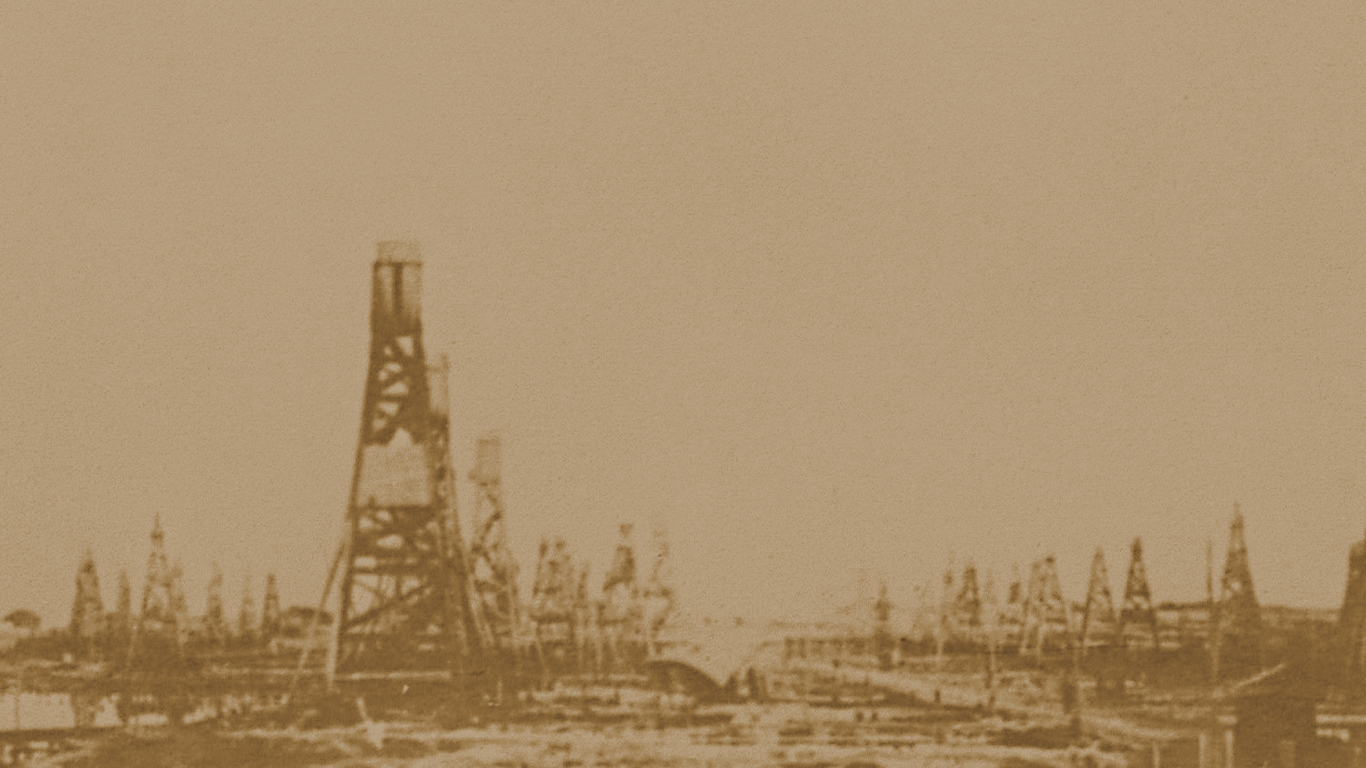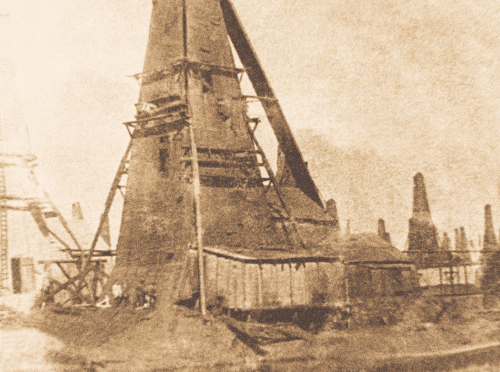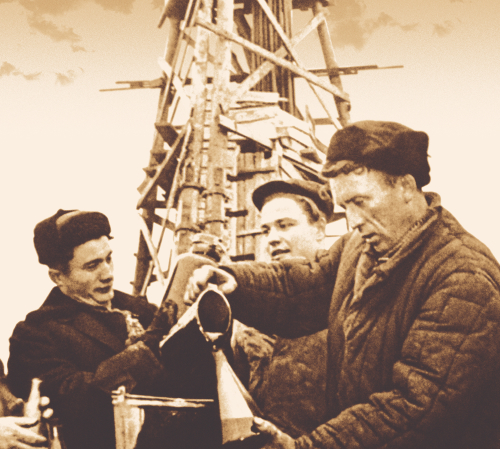
Assets and Great Victories

In 2019 the national oil-and-gas industry celebrated the 120-year jubilee. Absolutely this is the remarkable date for all Kazakhstan and for Embamunaigas JSC. There was in the first Emba fields that the glorious future of the Kazakhstan oil industry was built, which is today the locomotive of the country socio-economic development.
The history of the Kazakhstan oil industry begins upon in Atyrau terrain, from the first gush of oil in the well № 7 of the Karashungul structure in 1899 (now this is the contract territory of Embamunaigas JSC in Zhylyoyskiy district in Atyrau region).
Thsi event was the result of almost two hundred years of research in this region, starting with the expeditions of Prince Alexander BekovichCherkasskiy, the campaigns of Ivan Buchholz (1671–1741), the companion of Tsar Peter the Great, and other researchers.
According to the historical data, the first oil geological-and-prospecting and exploration works started in the deposit Iskine in 1892. In 1893 in Dossor, Karaton, Makat and Karashungul districts, the intensive exploration drilling developed within the territory, which area is equal to 24,000 square versts.
The drilling logs of those years have the information on 17 wells drilled in Karashungul in 1899. Lake Karashungul is characterized as “no doubt, karst / cave-in lake / the phenomenon, which nevertheless occurred in the South-Eastern wing, of at least two folds, composed of the suite of the alternating layers of gypsum and sandy clays / of gray color / with carbonaceous inclusions, sometimes the bituminous ones”.
The history of the Kazakhstan oil industry begins upon in Atyrau terrain
The oil of Karashungul is decribed as “…very light oil, / specific weight of the freshly mined oil in 2–3 days makes 0.849 /, transparent and prolific in gases”. There is also the information on 20 wells in Karaton, drilled in 1900, and some wells drilled in 1908. Karaton is characterozed as “dome-shaped occurence of oil-bearing strata”.
In 1908 in Iskine deposit, in the well № 5, from the depth 228 meters, the petroleum industrialist Stakheyev obtained the gush of the light oil with daily flow rate near 8 tons. However, the oilbearing areas attracted the world-wide attention after the large oil deposit was discovered in Dossor in April of 1911, the quality of which by its chemical composition exceeded the one produced in Baku.
In the short span of time, in the region, the “Western-Ural oil society”, “Central-UralCaspian society”, “Northern-Caspian oil company” and some others began the oil production, in which, in addition to the British, the investors from Germany, France and Switzerland owned the part of the shares. Some years after the discovery of the Dossor oil field, the Makat field discovered by Nobel company, produced the first oil in 1915. This event led to the fact that at the turn of 1914–1915, the oil production in these two fields for the first time passes the figure of 200,000 tons
The revolution and the subsequent civil war constrained the development of the Emba oil fields

The revolution and the subsequent civil war constrained the development of the Emba oil fields. Realizing the value of the raw hydrocarbons for the economy of the new state, the army fought the violent battles for the capture of the mouth of the Ural and the Emba. It was necessary to restore the destroyed, partially burned oil fields and the oil production under conditions of complete destruction, shortage of highly qualified specialists, staff turnover due to the lack of food and fresh water, lack of social conditions and epidemies, associated with these factors.
In these years the first head of Emba, Ruvim Friedman, the Board chairman of the oil fields of Ural-Emba region, had to solve the whole complex of the difficult challenges: to restore the oil fields, to construct the infrastructure in the industrial facilities, to provide the oilers and their families with the primary goods, to have responsibility for the health of the inhabitants and the education of children, to fight with the absenteeism and to ensure the discipline in the oil fields.
In those difficult years along with the oil fields development, there was in progress the formation of the Kazakh national specialists in the oil industry. If in the first production fields the Kazakhs worked as unskilled workers, watchmen and cargo delivery men, already in the 20–30 years of the past century the implementation of the program of the indigenization of the workforce started.
According to the prospective five-year plan for qualified workforce preparation in the Ural-Emba district for 1928–1933, in 1928–1929, the number of Kazakhs was more than 30 % out of 371 employees, near 46 % out of 2,277 operators.
By the 40-s, the ratio of operators in the oil fields is changing in favor of the representatives of indigenous people. Their professionalism is also growing. According to the summary table of the number of Stakhanovites for the “Kazakhstanneftekombinat”, for 182 Stakhanovites of the Dossor department there were 152 (83.5 %) employees of Kazakh nationality, in Makat – 242 Kazakhs-Stakhanovites (91 % of the total number of Stakhanovites), Iskine – 108 or 97 %, Koschagyl – 127 or 88 %, Baychunas – 213 or 97 %, etc.
Despite the difficulties of the first years, the oil fields production grew steadily. In the second half of the 20-s of the last century, the Emba oilmen began to implement the rotary drilling, that contributed to the development of the drilling operations, to the depth increasing of wells, to the rate of opening and exploration of the oil reservoirs. The rotary drilling in Emba was applied for the first time in the USSR. The Emba oilmen were the first in the USSR and Europe who mastered the super-deep drilling in Dossor and Makat – up to 2,500–2,800 m.
The acceleration of the prospecting and exploration and the opening of a number of fields in the 30-s resulted from the need to create the solid raw material base for the oil- and-gas industry, were created the laboratories, was opened the oil technical college. The construction of the Guryev – Emba – Orsk oil pipeline has begun.
The Great Patriotic War was the severe trial for all the country. The tireless work of the Emba oilmen, who produced thousands of tons of oil and supplied the fuel to the army, was the significant contribution to the victory over the fascism. During the Great Patriotic War, Embaneft did not stop its work for a minute. In these years, Emba produced the oil by 39 % more than during 5 pre-war years. In defiance the difficulties of the wartime, the Sagiz, Zholdybai, Komsomolskoye and Koshkar fields were put into production, the Komsomolsk – Makat and Koshkar – Sagiz oil pipelines were laid, and the steam power plant was built at Kamyskul.
The great demand for the high-quality fuel during the war and post-war years gave the powerful impulse to the development of the national oil production and petroleum refining industry in total. The Guryevskiy petroleum processing plant was built. The oilmen of Kazakhstan were first who mastered the secondary method of the oil production in the USSR. The Munayly, Bekbike and Karaton fields were put into operation. The method of drilling with hydraulic turbine downhole motor was acquired.
And since 1945, the Embaneft trust, transformed into the production enterprise “Kazakhstanneft”, included all the oil industry enterprises that operated after the war in the territory of the Kazakh SSR. The 50-s period was marked by the active geological exploration, due to which were open the new deposits: Terenozek, Tazhigali, Tules, Kara arna etc. These years the oil production in Kazakhstan reached the level of 1 million tons per year.
In the 60-s the high-speed turbine drilling was implemented

In the 60-s the high-speed turbine drilling was implemented, and the technical capabilities of the drilling rigs increased significantly. There were open and put into development the deposits Karsak, Prorva, Martyshi, Tanatar, Kamyshitovoye South-Zapadnoye, Kenkiyak.
During its entire long and glorious history, the oil country of Emba has accumulated the large amount of information and the wealth of experience in the theory and practice of the geological research and the oil production. The generations of the talented Kazakhstani oilmen and managers have grown up here. The Emba geologists discovered the largest raw hydrocarbon deposits in the territory of Western Kazakhstan – Tengiz, Uzen, Mangyshlak, Prorva, Kenbai, etc.
All the company achievements are the merit of its managers and of the ordinary oilmen who, despite the difficulties, due to their strength of purpose and selfless work, were creating the well-being of the future generations. Among these people are Safi Utebayev, Bulekbay Saguingaliyev, Zholdaskali Dosmukhambetov, Makhambet Batyrbayev, Naif Kamalov and many others.
The basis of the company stability is the labor dynasties
The basis of the company stability is the labor dynasties. Today, Embamunaigas employs the representatives of more than twenty dynasties, which three or more generations linked their lives with the difficult profession of an oilman. The total work experience of some of them exceeds 200 years. Among them are the dynasties of Zhylkyshiev, Kurmankulov, Torekhanov, Saliyev, Kulbaliyev, Bekmurziyev, Ondashev, Beshimov, Korpebayev, Ualiyev, Bisenbayev, Zhakashev, Aidarbekov, Rayimberguenov, etc.
Due to the labor dynasties, the Company preserves the continuity of generations, supports the family inheritance of the profession and passes on the invaluable experience, the respect for labor and the pride in their profession are raised in the younger generation.
It should be remembered also the contribution of people who, not being an oilman by profession, offered their labor mite to the development of the industry. Among them are power engineers, suppliers, automation engineers, heavy equipment drivers, servicing employees, medical staff and many others.
Today, Embamunaigas Joint Stock Company is a modern oil company that carries out the geological exploration, the development of the oil-and-gas fields, the production and the preparation of oil and gas. In the production activity of Embamunaigas joint stock company the main priorities are the safety of the staff and of the operations. In this area the company has achieved zero mortality and accidents indicators.
In order to determine the strategic directions for the further development of the Company, in 2018 was adopted the Concept for development of Embamunaigas JSC for the next 10 years. In the future, Emba is the highly efficient oil-andgas company with majority state participation that meets the highest safety standards, has the highly qualified staff and the cost-efficient resource base that ensures the long-term development.
